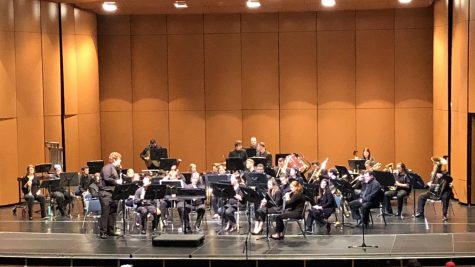Cultural Convergence Inspires
October 13, 2018

Nothing unwinds the mind like the eloquence of music. A great tool for relaxation and introspection, music can be enjoyed with friends and family and can provide a pleasant social experience.
The students and faculty of Central Connecticut’s music department look to administer this splendor with performances from their many ensembles ranging from choir to orchestra and jazz. Their talented musicians recently charmed CCSU students and family with a performance from the wind ensemble and symphonic band in Welte Auditorium on Wednesday. An edifying experience to the spectators and performers alike, the performance was a result of hard work since the beginning of the semester. The ensemble was led by conductor, Dr. Robert Schwartz, who is enjoying his first year with the musicians at CCSU. They performed five pieces differing in style and cultural background.
The rehearsal timeframe that the band ensemble had to work with was slim. Given that marching band rehearses on Mondays, the wind ensemble and symphonic band had Wednesday of every week since the beginning of the semester to rehearse. The regular class meetings span from 3:05 to 5:45 providing a timeframe of two hours and forty minutes for the ensemble to practice. Significant effort into perfecting the pieces needed to go into these hours given the configuration of the concert; five intricate pieces and five different styles.
The program was put together by Dr. Schwartz, titled “Cultural Convergence.” Some features include the “Athletic Festival March,” composed by Russian composer Sergei Prokofiev. Being the first of his “Four Marches,” it was written for the 1936 Olympic games in Berlin. “Dancing At Stonehenge” (2003) is a piece that incorporates musical ideas from Brazilian music, American Jazz and Renaissance to create a collision of cultures, celebrating the sharing of this common location throughout history by different groups of people.
The other three varied in theme, whether it be the slow-moving “Lux Arumque” arranged for all brass instruments, composed by American composer and conductor Eric Whitacre, or the bright and colorful “Puszta: Four Gypsy Dances.” (The Ammon School of Liberal Arts and Social Sciences (2018). Cultural Convergence [Brochure])
“When I was looking for pieces to put together for this concert, I knew it had to be something that was going to be easy to put together, not necessarily easy to play,” Dr. Schwartz said. “I started picking a couple of pieces and realized there was kind of a cultural theme, and before you know it I had five pieces that all had different cultures.”
Each piece brought a new impression and was successful in altering the audience’s mood.
“The energy was really good. That’s something always very important to me whenever I am doing a concert,” Schwartz said.
After the concert, the student performers were congratulated by spectating friends and family. It was evident that the effects of the concert went both ways. Each musician had something to relate to from the music. They had a drive which made them want to perfect and perform the pieces well.
“What I felt was really done well this semester, specifically under the leadership of Dr. Schwartz, I felt like we were very much so more prepared than last year or maybe even some other years,” Junior Josh Goldenberg, one of the clarinet players at Wednesday’s performance, said.
Goldenberg has been playing the clarinet for 12 years and has been part of the wind ensemble and symphonic band for all three years of his collegiate career. Undoubtedly versed in musicality, his passion for the art stems from more personal factors. He cited one of his favorite pieces of the night was the Russian “Athletic Festival March.”
“My grandfather is a music teacher, so is my grandmother,” Goldenberg said. “Clarinet, in general, has a special place in my heart.”
Goldenberg is just one of the many inspired and talented musicians which comprise the wind ensemble and symphonic band. Concerts like these are incredible opportunities for them to express their passions musically to an audience that appreciates and cherishes their talent. CCSU’s music department flourishes with other ensembles, which share the same level of dedication to their craft and provide great performances.
The next wind ensemble and symphonic band concert is on Dec. 5 in Welte Auditorium, with an emphasis on American music.




